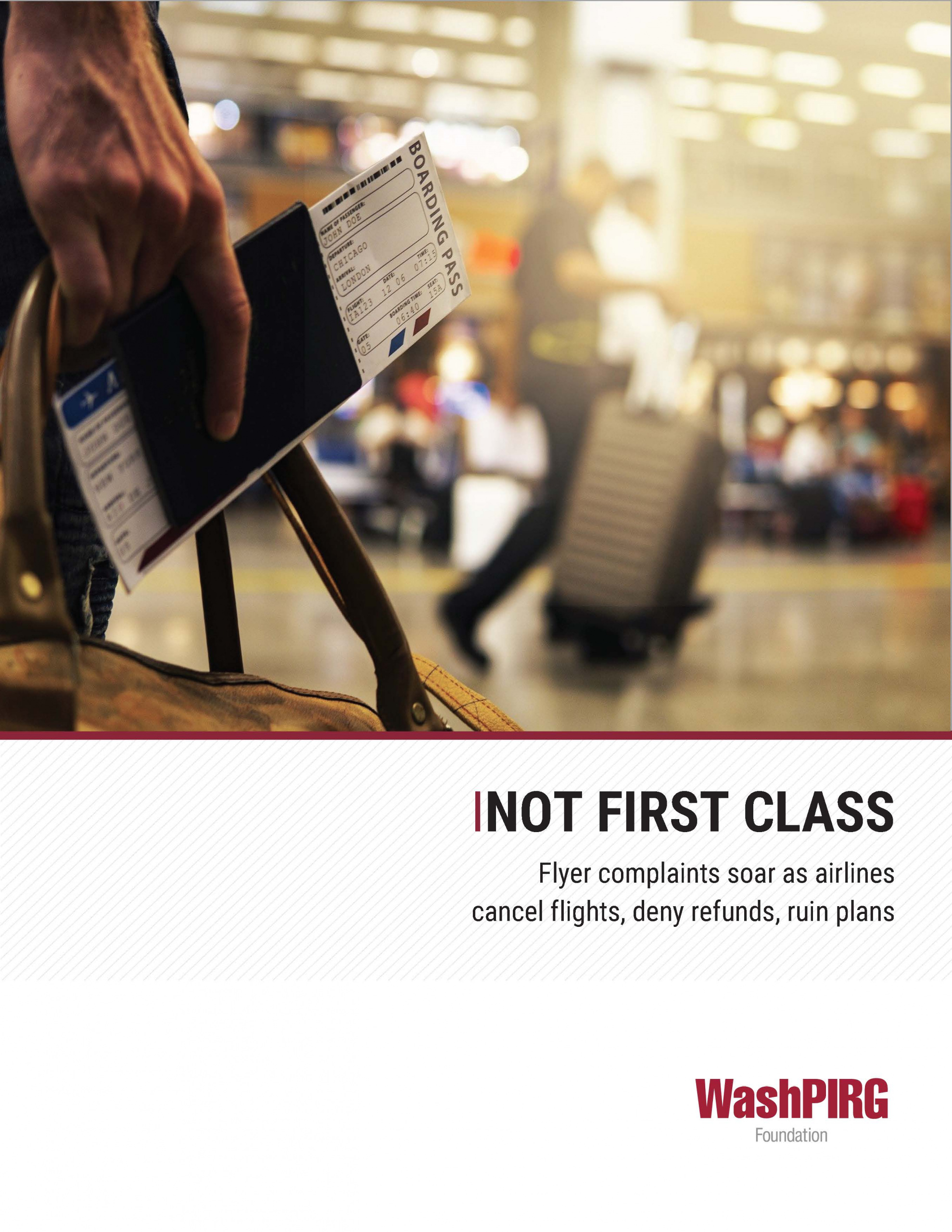
Not First Class
Flyer complaints soar as airlines cancel flights, deny refunds, ruin plans
New report highlights how flier complaints have soared as airlines cancel flights, deny refunds, and ruin plans. Find out which airlines have the most complaints and what you can do.

Downloads
WashPIRG Foundation
Kristin Horowitz and her family ended a two-week vacation along the East Coast in August and were scheduled to fly home to California on United Airlines on Aug. 11. The flight was canceled at the last minute, supposedly for mechanical reasons. That began a two-day ordeal of more canceled flights, hours upon hours on hold with United, conflicting instructions from United and worry about their two dogs in a kennel back home. Horowitz, a small business owner in San Luis Obispo, along the coast in the middle of California, told U.S. PIRG she incurred $858.28 worth of expenses for two extra days’ worth of hotels, meals, a rental car and boarding for their dogs.
After spending hours trying to get the reimbursement she said she was promised by United, and then filing a complaint with the U.S. Department of Transportation (DOT), she got a $500 check from United, plus four vouchers she swears she’ll never use because she doesn’t trust United enough to make plans with the airline. She also successfully disputed two of the airline tickets with her credit card.
It’s been nearly four months. Horowitz is still seething with anger, not just about what happened but about how she said she was treated. “I felt absolutely helpless,” she said. The stress “totally undid any of the rest of the trip we’d taken. As someone whose business was deeply affected by the pandemic and I had to fight the entire time to keep it and my employees employed, this was supposed to be an opportunity to recharge and unfortunately, I came back just as much in panic mode as when I left.”
Horowitz is one of 34,011 people who was upset enough about their experience flying to file a formal complaint with the DOT in 2021 through August of this year.
After being devastated by COVID-19 for most of 2020, the airline industry may be getting worse for customers. Sporadic mass cancellations by airlines may be the new norm. In November, American Airlines, the nation’s largest carrier, canceled more than 2,000 flights over a period of several days.
The month before, it was Southwest, the second largest, canceling more than 2,000 flights in one weekend.4 This summer, Spirit Airlines infamously canceled nearly 3,000 flights during an 11-day stretch.
Meanwhile, hundreds of thousands of consumers are still trying to get $10 billion in refunds for flights canceled last year.
The pandemic was the catalyst for much of the change in the airline industry that consumers find themselves dealing with now.
The government acted fast last year to save the industry by giving airlines $50 billion in taxpayer money.7 The first $25 billion grant was aimed at saving 75,000 jobs; if that happened, each job cost $300,000 to save. The money kept the airlines from filing for bankruptcy and ended up protecting the shareholders’ investments. From April 1, 2020, to March 31, 2021, U.S. passenger airlines lost $34 billion, according to the Bureau of Transportation Statistics. They turned a profit of $1 billion in the second quarter of this year.8 The four largest airlines all posted profits in the third quarter of this year.
Obviously, consumers and the economy need the airlines to exist, but it’s unclear how that money was used to help consumers. In theory, part of that money could have been used to refund flights that weren’t taken due to the pandemic or invested in the operations side of the airline industry to help it run better this year. If the taxpayer money had been invested adequately, complaint volume wouldn’t be so high and flights would be more punctual.
Not every airline and airport reacted to the pandemic equally. The DOT’s Office of Aviation releases monthly Air Travel Consumer Reports that contain data on complaints against airlines, tour operators and travel agents, and data about flights departing and arriving on time.
The DOT says a complaint is to be filed after an airline has had a chance to resolve an issue raised to the consumer’s satisfaction. So complaints should point to how well airlines deal with issues. The complaints are publicly available.
This enabled WashPIRG Foundation and U.S. PIRG Education Fund to dive deeper into the state of the airline industry now, compared with periods during the last five and a half years.
We looked at the data around more than 200,000 complaints against the airline industry and the data around flight departures and arrivals starting in January 2016. This analysis should help consumers to take as much as possible into account when deciding where to fly and through which airline.
Topics
Find Out More


Safe At Home in 2024?

5 steps you can take to protect your privacy now
